Microscope the condenser - Study guides, Class notes & Summaries
Looking for the best study guides, study notes and summaries about Microscope the condenser? On this page you'll find 434 study documents about Microscope the condenser.
Page 4 out of 434 results
Sort by
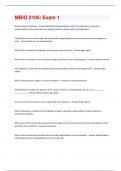
-
MBIO 2105: Exam 1 Questions & Answers Already Graded A+
- Exam (elaborations) • 8 pages • 2024
-
- $7.99
- + learn more
Define aseptic technique - Answer-Methods and procedures used in the laboratory to prevent contamination of the work area, the worker and the cultures with microorganisms. The Dutch merchant who made and used quality magnifying lenses to see and record microorganisms was? - Answer-Antonie van Leeuwenhoek Which form of medium is typically used to grow stock cultures? - Answer-agar slants Which form of medium is used to obtain large quantities of fresh cells/bacteria? - Answer-Broth medium T...
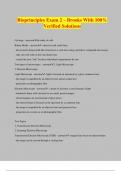
-
Bioprinciples Exam 2 – Brooks With 100% Verified Solutions
- Exam (elaborations) • 31 pages • 2024
- Available in package deal
-
- $13.49
- + learn more
Bioprinciples Exam 2 – Brooks With 100% Verified Solutions Cytology - answerthe study of cells Robert Hooke - answer- observed cork could float - discovered a honeycomb-like structure in a cork slice using a primitive compound microscope - only saw cell walls as this was dead tissue - coined the term "cell" for these individual compartments he saw Two types of microscopes: - answer1. Light Microscope 2. Electron Microscope Light Microscope - answer- light is focused on specimen by a...
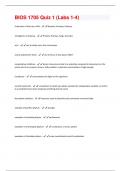
-
BIOS 1705 Quiz 1 (Labs 1-4) Questions And Answers Graded A+
- Exam (elaborations) • 8 pages • 2024
- Available in package deal
-
- $7.99
- + learn more
3 domains of the tree of life - Bacteria, Archaea, Eukarya 4 kingdoms of eukarya - Protista, Plantae, Fungi, Animalia arm - use to safely carry the microscope coarse adjustment knob - use to focus at low power ONLY competative inhibition - when molecules similar to a substrate compete for placement on the active site of an enzyme, Vmax is still possible is substrate concentration is high enough Condenser - concentrates the light on the specimen control treatment - a treatment in which you...
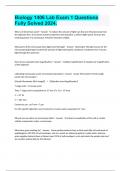
-
Biology 1406 Lab Exam 1 Questions Fully Solved 2024.
- Exam (elaborations) • 7 pages • 2024
-
Available in package deal
-
- $7.99
- + learn more
Why is oil immersion used? - Answer To reduce the amount of light rays that are refracted away from the objective lens. It increases numerical aperture and maintains a uniform light speed. increase the resolving power of a microscope. Prevents refraction of light. What parts of the microscope does light travel through? - Answer Illuminator-The light source for the microscope.Diaphragm-Controls the amount of light entering the condenser. Condenser lens- Focuses light through the specimen. ...
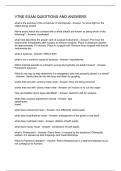
-
VTNE EXAM QUESTIONS AND ANSWERS
- Exam (elaborations) • 78 pages • 2023
-
Available in package deal
-
- $14.99
- + learn more
what is the purpose of the condenser of microscope - Answer- To focus light on the object being viewed Nerve axons which are covered with a white sheath are known as being which of the following? - Answer- myelinated what best describes the proper care of surgical instruments - Answer- Pre-rinse the instruments immediately after surgery to remove residues. Place in ultrasonic cleaner for approximately 10 minutes. Place in surgical milk. Remove from surgical milk and let instruments dry. ...
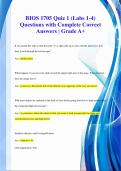
-
BIOS 1705 Quiz 1 (Labs 1-4) Questions with Complete Correct Answers | Grade A+
- Exam (elaborations) • 16 pages • 2024
- Available in package deal
-
- $12.99
- + learn more
If you mount the slide so that the letter "e" is right side up as seen with the naked eye, how does it look through the microscope? Ans: upside down What happens if you move the slide toward the upper right area of the stage. What direction does the image move? Ans: it moves to the bottom left of the field of view (opposite of the way you move) Why must objects be centered in the field of view before going from low to high power using the compound light microscope? Ans: so you know ...
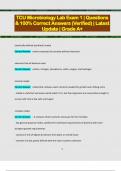
-
TCU Microbiology Lab Exam 1 | Questions & 100% Correct Answers (Verified) | Latest Update | Grade A+
- Exam (elaborations) • 26 pages • 2024
-
- $13.99
- + learn more
hemically defined (synthetic) media Correct Answer: media composed of precisely defined chemicals elements that all bacteria need Correct Answer: carbon, nitrogen, phosphorus, sulfur, oxygen, and hydrogen minimal media Correct Answer: media that contains exact nutrients needed for growth and nothing extra - media is useful b/c we know exactly what's in it, but few organisms are resourceful enough to survive with only a few salts and sugars complex media Correct Answer: - it contains a...
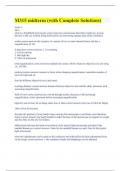
-
M315 midterm (with Complete Solutions)
- Exam (elaborations) • 30 pages • 2023
-
Available in package deal
-
- $13.49
- + learn more
week 1: lab 1: what is a brightfield microscope correct answers a microscope that allows light rays to pass directly to the eye without being deflected by an intervening opaque plate in the condenser ocular correct answers the eyepiece. It consists of two or more internal lenses and has a magnification of 10x 4 objectives correct answers 1. 5x scanning 2. 10x low-power 3. 40x high-dry 4. 100x oil immersion total magnification correct answers multiply the ocular (10) by whatever ...
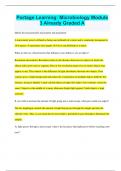
-
Portage Learning: Microbiology Module 3 Already Graded A
- Exam (elaborations) • 18 pages • 2023
- Available in package deal
-
- $9.99
- + learn more
Portage Learning: Microbiology Module 3 Already Graded A Define the measurements micrometer and nanometer. A micrometer (μm) is defined as being one-millionth of a meter and is commonly designated at 10-6 meters. A nanometer (nm) equals 10-9 m or one-billionth of a meter. What are the two critical factors that influence your ability to see an object? Resolution and contrast. Resolution refers to the distance between two objects at which the objects still can be seen as separate. Poor or low r...
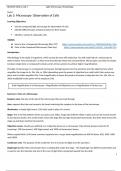
-
BIOS 242 Lab 3: Microscopy- Observation of Cells
- Other • 11 pages • 2023
-
- $19.49
- + learn more
Lab 3: Microscopy- Observation of Cells Learning Objectives: Use the compound light microscope for observation of cells. Identify different types of bacteria based on their shapes. Identify a variety of eukaryotic cells. VIDEOS: a) How to Use a Compound Microscope (Elon TLT) b) Parts of the Compound Microscope (Tami Guy) Introduction: Microbiology is the study of organisms, which cannot be seen with naked eye. You will need help of a microscope to observe these “tiny anim...

How much did you already spend on Stuvia? Imagine there are plenty more of you out there paying for study notes, but this time YOU are the seller. Ka-ching! Discover all about earning on Stuvia


